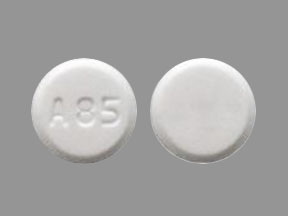
Amantadine Coupons & Savings Card – Discount Prices from $17.68
Amantadine is a medication primarily used to help manage symptoms of movement disorders in adults, such as Parkinson's disease and drug-induced extrapyramidal symptoms. It works by increasing dopamine levels in the brain, which aids in improving movement coordination and alleviating symptoms like trembling, stiffness, and slowness of movement. Amantadine achieves this by acting as an N-methyl-D-aspartate (NMDA) antagonist, helping to restore the balance of natural neurotransmitters.
Additionally, amantadine has antiviral properties and was once used to prevent or treat influenza A by inhibiting the growth of the flu virus. However, it is no longer recommended for this purpose in the United States and Canada due to resistance. For flu prevention, getting an annual flu shot is advised.
This medication is typically taken orally once or twice daily. Potential side effects may include nausea, dizziness, and trouble sleeping. It is crucial to consult with a healthcare professional before starting amantadine to ensure its safety and effectiveness for your condition.
Our coupons are free to use. Before paying, show the pharmacist your Amantadine savings card to get your free discount. Use our filters below to edit the prescription box to match your needs. The Amantadine prices will update based on your prescription needs. Above our Amantadine coupons, you can change your location to see pharmacy prices and costs in other areas. We're here to help you buy Amantadine at the lowest price with our prescription discount card.
My prescription
Edit
100MG, Amantadine (30 Tablets)
Select pharmacy

CVS
$23.09
COUPON PRICE
Walmart
$17.68
COUPON PRICE
Albertsons
$18.00
COUPON PRICE
Walgreens
$18.84
COUPON PRICEAmantadine savings card
Show this card to your pharmacist
Walmart
$17.68
BIN
ID
PCN
GRP
019876
LHB237FECD
CHIPPO
LHX
Powered by
Amantadine is a medication primarily used to help manage symptoms of movement disorders in adults, such as Parkinson's disease and drug-induced extrapyramidal symptoms. It works by increasing dopamine levels in the brain, which aids in improving movement coordination and alleviating symptoms like trembling, stiffness, and slowness of movement. Amantadine achieves this by acting as an N-methyl-D-aspartate (NMDA) antagonist, helping to restore the balance of natural neurotransmitters.
Additionally, amantadine has antiviral properties and was once used to prevent or treat influenza A by inhibiting the growth of the flu virus. However, it is no longer recommended for this purpose in the United States and Canada due to resistance. For flu prevention, getting an annual flu shot is advised.
This medication is typically taken orally once or twice daily. Potential side effects may include nausea, dizziness, and trouble sleeping. It is crucial to consult with a healthcare professional before starting amantadine to ensure its safety and effectiveness for your condition.
Our coupons are free to use. Before paying, show the pharmacist your Amantadine savings card to get your free discount. Use our filters below to edit the prescription box to match your needs. The Amantadine prices will update based on your prescription needs. Above our Amantadine coupons, you can change your location to see pharmacy prices and costs in other areas. We're here to help you buy Amantadine at the lowest price with our prescription discount card.
Related NMDA receptor antagonists prescriptions
More prescriptions for Parkinson's disease
coupons from$15.45Save 87%
coupons from$47.05Save 65%
coupons from$407.59Save 77%
coupons from$47.86Save 60%
coupons from$7.61Save 59%
coupons from$757.80Save 53%
coupons from$15.45Save 87%
coupons from$42.64Save 66%
Related NMDA receptor antagonists prescriptions
Memantine Save 55%coupons from $29.74
Gocovricoupons from $3495.89
Ketamine Save 9%coupons from $11.84
More prescriptions for Parkinson's disease
Carbidopa-levodopa Save 87%coupons from $15.45
Stalevo 100 Save 65%coupons from $47.05
Crexont Save 77%coupons from $407.59
Rasagiline Save 60%coupons from $47.86
Diphenhydramine Hcl Save 59%coupons from $7.61
Ongentys Save 53%coupons from $757.80
Dhivy Save 87%coupons from $15.45
Parlodel Save 66%coupons from $42.64
Amantadine dosage forms
Use our Amantadine 100MG coupon with prices from $17.68 for 30 Tablets. You can also use our Amantadine 100MG coupon with prices from $3.01 for 1 Tablet. We have a Amantadine 100MG coupon with prices from $42.28 for 100 Tablets. You can use our Amantadine 100MG coupon with prices from $106.20 for 500 Tablets.
Dosage Quantity Price from Per unit 100MG 30 Tablets $17.68 $0.59 100MG 1 Tablet $3.01 $3.01 100MG 100 Tablets $42.28 $0.42 100MG 500 Tablets $106.20 $0.21
| Dosage | Quantity | Price from | Per unit |
|---|---|---|---|
| 100MG | 30 Tablets | $17.68 | $0.59 |
| 100MG | 1 Tablet | $3.01 | $3.01 |
| 100MG | 100 Tablets | $42.28 | $0.42 |
| 100MG | 500 Tablets | $106.20 | $0.21 |
